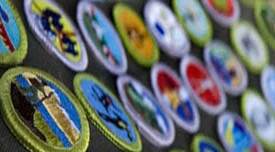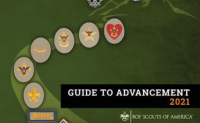 If you’re a merit badge counselor, you’re probably pretty familiar with the role that merit badges play in the Boy Scout advancement system. Once they reach First Class, Scouts must earn a certain number of merit badges to continue advancing, with some drawn from the list of badges required for the rank of Eagle Scout and the rest on any subject at the Scout’s discretion.
If you’re a merit badge counselor, you’re probably pretty familiar with the role that merit badges play in the Boy Scout advancement system. Once they reach First Class, Scouts must earn a certain number of merit badges to continue advancing, with some drawn from the list of badges required for the rank of Eagle Scout and the rest on any subject at the Scout’s discretion.
The merit badge counselor, therefore, has a pivotal role in the advancement process for our older Scouts, and the Scouting experience for all Boy Scouts. It’s not just older boys who can earn merit badges – any Scout can work toward completing the requirements and earn any merit badge in any rank at any time. The minimum age is the age at which he joins Boy Scouting, and he has until he turns eighteen to complete them. It’s a common misconception that Scouts must be of a certain age, rank or ability in order to work on merit badges, or that there is a time limit other than his 18th birthday. And while the Scout and Scoutmaster should discuss embarking on a merit badge, the decision to do so is the Scout’s.
Originally called proficiency badges by Baden-Powell in the English Scouting organization, they morphed from being signifiers of Scout skill ability into short courses of study on individual topics when they crossed the ocean. The Boy Scouts of America originally issued fifty-seven merit badges and incorporated them into the advancement system. Thirty-three survive to today, with First Aid being the original and sole surviving Eagle-required badge. And while the requirements can be a challenge to complete, they are not intended to make a Scout an expert in any of the subjects, but rather provide a basic orientation and to hopefully whet his interest.
The counselor, therefore, has crossed over from one who would instruct and test proficiency in Scout skills into one who works with the Scout to guide him in learning the material required and giving final approval for completing the requirements.
From there, the role of the merit badge counselor varies tremendously. As a counselor, I have worked with Scouts in a number of ways. These have included organizing multiple small-group study sessions to teach all the requirements, as well as having Scouts call me and request a review, having completed all the requirements on his own.
Which is permissible and appropriate depends on the reading of the requirements. For some merit badges, a Scout can indeed finish the work on his own, demonstrate the requirements to a counselor and obtain a sign-off in one meeting. For others, however, multiple meetings are required, such as for when the Scout must discuss a project or other task with the counselor before beginning the task, as is the case with Family Life (one of the merit badges I counsel).
Although not expressly prohibited, large group counseling is generally frowned upon. The Guide to Advancement cautions that in such situations, the counselor must confirm that each and every Scout completes each and every requirement, including the show, demonstrate, do and tell actions. It is not sufficient for a Scout to just sit in a class, write notes on a worksheet and turn it in.
The counselor, therefore, needs to tailor his or her counseling style to the merit badge and to the Scout. This means determining just how much teaching and hand-holding the counselor should do versus how much self-study and learning the Scout is expected to accomplish. Generally speaking, a Scout will learn more if he studies on his own, but he can certainly benefit from the teaching that a counselor can provide. As with other interactions with Scouts, it’s more effective if the counselor leads the Scout to learn and discover the answers on his own, rather than handing them over, as might be done in a classroom setting.
In addition to the three things you should consider before becoming a counselor, and completing the steps to become registered and active, you’ll want to assess your style of interaction with the Scouts you counsel. This will help to ensure that you are upholding the integrity of the merit badge program while giving Scouts the greatest opportunity to learn and discover the subject matter that you are generously sharing your knowledge of. It will also transform the process from a stale learning experience for the Scout into a window of enlightenment into a new world for him.
Image from Michigan Crossroads Council
This post first appeared on Bobwhite Blather.




